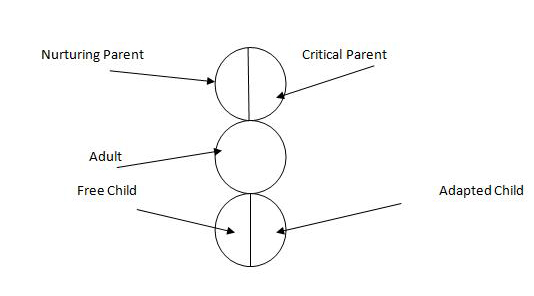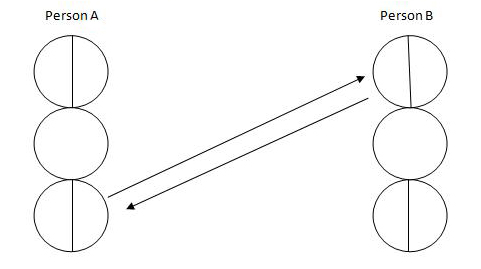Transactional Analysis counselling in Cheadle, near Stockport and South Manchester
What is transactional analysis counselling ?
 Transactional analysis is a theory of personality ; a way for personal change and growth and it's a way of understanding relationships/ groups. Eric Berne introduced transactional analysis in the 1950s. Transactional analysis is based on 3 philosophical truths -
Transactional analysis is a theory of personality ; a way for personal change and growth and it's a way of understanding relationships/ groups. Eric Berne introduced transactional analysis in the 1950s. Transactional analysis is based on 3 philosophical truths -
- We are all ok - whatever our behavior, we are all fundamentally equal as human beings.
- Everyone has the capacity to think.
- People decide their own destiny, but these decisions can be changed. Early on in life we make conclusions about ourselves, the world and other people. These decisions are made out of awareness in response to the environment we are brought up in. Throughout our life we process and interpret our experiences to fit in with our early conclusions about ourselves , others and the world. Berne called this our " script" or life plan.
What are the main building blocks of transactional analysis?
The 4 main building blocks of transactional analysis are ego states, transactions ,scripts and games.
What are ego states?
In transactional analysis there are 2 types of ego states - structural and functional. The structural ego state is a set of thoughts, feelings and behaviour copied from our parents. Whereas the structural ego state gives us information about the content that is inside the person ie what we can't see; the functional ego state is observable behaviour.In the functional model there are 5 ego states - all of which have positive
and negative qualities. 
The Nurturing Parent ego state includes positive qualities eg being caring,
supportive, empathetic as well as negative aspects like being smothering.
The Critical Parent ego state is displayed in controlling, disapproving
behaviour as well as assertive or protective behaviour. The Adult ego
state is logical, problem solving, calm and rational. The Free Child ego
state includes emotionally expressive, care free, spontaneous behaviour
as well as chaotic behaviour. The Adapted Child ego state includes positive
qualities eg being cooperative, considerate, polite as well as anxious,
fearful behaviour. The Adapted Child ego state is displayed in both rebellious
and adaptive behaviour because both are a reaction to something in our
history.
An integrated person is someone who has access to all 5 ego states . Often clients come into counselling because they are having difficulties in their life expressing certain emotions eg anger, sadness.
What are transactions?
There are 3 types of transactions- complementary, crossed and ulterior.- Complementary transactions. To get on the same wavelength with someone and connect with them, we need to have complementary transactions. The main communication channels for complementary transactions are -
- expressive Free Child
 caring Nurturing Parent
caring Nurturing Parent - assertive Critical Parent
 cooperative Adapted Child
cooperative Adapted Child - rational Adult
 rational Adult
rational Adult - playful Free Child
 playful Free Child
playful Free Child

Complementary transactions occur when the ego state transaction arrows
between 2 people are parallel. For example in the diagram above person
A is upset (coming from their expressive Free Child ego state) and person
B responds from Nurturing Parent.
- Crossed transactions. If we want to change unsatisfactory communication with another, we need to change ego state and make a crossed transaction , inviting the other person to change ego state as well. For example if someone continues to criticize you from Critical Parent ("you shouldn't have done that"), by responding from Nurturing Parent ("I can understand that was awful for you…" ) will invite a Free Child response ("I feel hurt").
- Ulterior transactions. These occur when there is an underlying psychological message or agenda underneath what is actually being said. This ulterior message is conveyed non verbally eg through the person's tone of voice, gestures etc. Eric Berne said that the outcome of any interaction will always be determined by the ulterior message.
What are scripts?
Eric Berne defined scripting as "an unconscious life plan", which is "made in childhood, reinforced by the parents, justified by subsequent events, and culminates in a chosen alternative". Early on in life we make conclusions about ourselves, the world and other people. These decisions are made out of awareness in response to the environment we are brought up in.
Throughout our life we process and interpret our experiences to fit in with our early conclusions about ourselves, others and the world. By filtering our experiences to fit in with our script we redefine reality in order to make the outside world fit in with what we feel, think and believe.
As a psychotherapist /counsellor becoming aware of a client's script helps me to understand how the client relates to themselves, others and the world around them. With awareness decisions that were made in childhood, out of awareness, can be re decided in adulthood. In this way counselling can help change the neural pathways in a client's brain.
Seeing a psychotherapist /counsellor can help a client change negative beliefs and thought patterns about themselves and others can these can be replaced with more compassionate beliefs. Game playing is a theory used to explain addictions, eating disorders and self harm.
What are games?
Games are sets of ulterior transactions which are played without awareness and which always end up with each person experiencing negative, uncomfortable and familiar feelings. They are repetitive and will always include a moment of surprise or confusion.
We all play psychological games to some extent, but when game playing becomes habitual and self destructive, seeing a counsellor can help you to find different ways of getting your needs met.
Games often occur in couples. We seek out a partner to play games with in order to reinforce the life script that we decided in childhood. Game playing is a bid for intimacy, an attempt to get close to your partner. However games invariably end with each person in the couple feeling misunderstood and familiar unresolved feelings from childhood are heightened eg feeling depressed, angry , anxious or stressed. Games reinforce our childhood decisions about ourselves, others and the world eg 'no one understands me' ; 'I'm not important'; 'I never get what I want'; 'everyone lets me down'etc.


